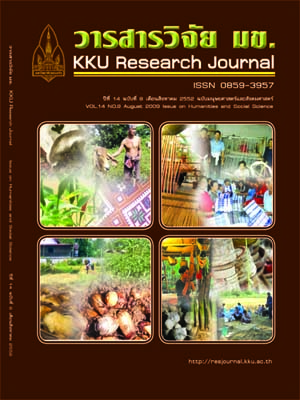Local livelihood : knowledge management in natural food collection (Thai)
Main Article Content
Abstract
This article aims to present the results of our study. The purposes of this research were to study the knowledge management process related to natural food collection and to analyze social mechanism s used in knowledge transfer at household and community levels in Ban Hin-Herb, Tambol Prayeun, Amphur Prayeun, Khon-Kaen Province. Knowledge management is used as a key concept to formulate a conceptual framework for this study. Qualitative research methodology was employed for data collection and analysis. Research tools and techniques used include interview guidelines, in-depth interviews, field note taking, and participant and non-participant observations. Data collection was done through in-depth interview and group discussion with the following key informants: the village headman, knowledgeable persons of the village, and common villagers. The results of this research revealed that knowledge management has been a part of the socialization process. Family, kinship and social relations were found to be the key social mechanisms in knowledge management. In addition, it was found that new knowledge is constructed based on local wisdom, which is very beneficial to the villagers to cope with changes in natural resources in their local areas.


